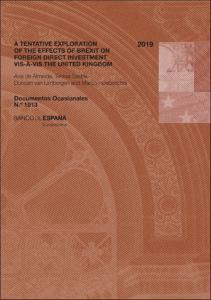A tentative exploration of the effects of Brexit on foreign direct investment vis-à-vis the United Kingdom
Authors
Issue Date
24-May-2019
Physical description
26 p.
Abstract
La integración en la Unión Europea (UE) ha impulsado la inversión extranjera directa (IED) hacia el Reino Unido, que mantiene un stock relativamente importante de entradas en forma de IED. Este ha aumentado notablemente desde 2005, alcanzando el 61% de su producto interior bruto (PIB) en 2017. La salida del Reino Unido de la UE y del Mercado Único probablemente resultará en flujos de IED más reducidos entre ambos destinos de inversión. El objetivo de este estudio es examinar los efectos que el resultado del referéndum del brexit, de junio de 2016, ha podido tener en la actividad de IED relacionada con el Reino Unido. Si bien los flujos de IEA son notablemente volátiles, con presencia de un gran número de valores atípicos, y con la cautela precisa por la escasa disponibilidad de datos temporales posteriores al referéndum, el análisis encuentra cierta evidencia de una disminución en los flujos brutos de IED entre el Reino Unido y la UE con posterioridad al referéndum. Esto se evidencia, en particular, en el caso de las grandes economías de la UE y en el de Irlanda. Con respecto a una forma particular de IED, inversión en nuevos proyectos (greenfield IED), se encuentra evidencia de un descenso en proyectos anunciados y gastos de capital en el Reino Unido por parte de otros países de la UE en el período posterior al referéndum, así como en la inversión proveniente de Estados Unidos, uno de los socios más importantes no pertenecientes a la UE. (...)
European Union (EU) integration has boosted inward EU foreign direct investment (FDI) into the United Kingdom (UK). Within the EU, the UK has a relatively significant stock of inward FDI, having reached 61% of its Gross Domestic Product (GDP) in 2017 and risen strongly since 2005. The exit of the UK from the EU and the Single Market will probably result in reduced FDI amongst both investment destinations. The aim of this study is to look at the “real-time” effects of the Brexit June 2016 referendum outcome and its aftermath on UK-related FDI activity. Although FDI flows are notably volatile and biased by periodic non-systematic outliers, and despite some caveats on data sources and availability of time series data, we find tentative evidence of a post-referendum slowdown in gross FDI flows between the UK and the EU, notably involving the big EU economies and Ireland. Regarding a very favoured form of FDI, greenfield FDI, we document a post-referendum fall in announced projects and capital expenditures into the UK by both other EU countries as well as one of the most important non-EU partners, the United States. (...)
European Union (EU) integration has boosted inward EU foreign direct investment (FDI) into the United Kingdom (UK). Within the EU, the UK has a relatively significant stock of inward FDI, having reached 61% of its Gross Domestic Product (GDP) in 2017 and risen strongly since 2005. The exit of the UK from the EU and the Single Market will probably result in reduced FDI amongst both investment destinations. The aim of this study is to look at the “real-time” effects of the Brexit June 2016 referendum outcome and its aftermath on UK-related FDI activity. Although FDI flows are notably volatile and biased by periodic non-systematic outliers, and despite some caveats on data sources and availability of time series data, we find tentative evidence of a post-referendum slowdown in gross FDI flows between the UK and the EU, notably involving the big EU economies and Ireland. Regarding a very favoured form of FDI, greenfield FDI, we document a post-referendum fall in announced projects and capital expenditures into the UK by both other EU countries as well as one of the most important non-EU partners, the United States. (...)
Publish on
Documentos Ocasionales / Banco de España, 1913
Subjects
Inversión exterior directa; Pertenencia a la UE; Moneda única; Brexit; Foreign direct investment; FDI; EU membership; Single currency; Finanzas internacionales; Integración económica europea; Reino Unido
Appears in Collections:












